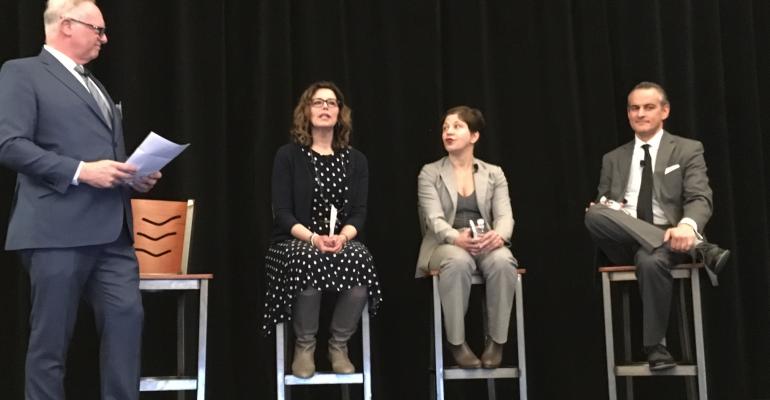The monsoon-like rainstorm that enveloped the New York Marriott at the Brooklyn Bridge during the Global Meetings Industry Day conference did nothing to dampen the enthusiasm of attendees. When MC and panel moderator David Adler, CEO and founder of BizBash, opened the proceedings by asking, “Who here loves your job?” everyone in the room raised their hands immediately.
The event, hosted by the New York chapters of Meeting Professionals International and the Professional Convention Management Association, and sponsored by Kalahari Resorts and Conventions, began with a networking reception, followed by a panel discussion with Howard Givner, managing director and head of Americas at Grass Roots Meetings and Events; Michelle Russell, editor in chief of Convene magazine at the PCMA; and Diana Voto, CMP, national sales director at Disney. Adler dubbed the topic for discussion “the Bathroom Bill Question,” but it encompassed the effect that any legislation—from bills in Indiana and North Carolina allowing businesses not to serve the LGBTQ community or restricting access to the bathroom of choice for trans people, to the executive orders on immigration—that are posing problems for meeting planners. Givner started the discussion by explaining that even if the issue has not affected meeting professionals yet, there was a good chance it would in the near future as there are currently several bills echoing North Carolina’s House Bill 2 going through the legislatures in Texas and several other states. He said, “These laws are not going to be met with acceptance in the industry so you need to know what’s going on.” He asked attendees to think about the question: If you have planned a meeting and the authorities in that location pass a law you think your attendees will not support, how do you respond?
Serious Consequences
Russell highlighted just how high the stakes are with the example of the American Counseling Association. After the passage of a “religious freedom” law targeting their profession and the LGBTQ community in Tennessee, the group spent $1 million to cancel a planned conference in Nashville and moved it to San Francisco. The American Public Transport Association took another approach when North Carolina passed HB2. The organization went ahead with a scheduled conference in Charlotte but included educational sessions on discrimination awareness and prevention to make it clear that they disagreed with the legislation.
Givner discussed both sides of the cancellations issue. He agreed that withdrawing from a location has a negative impact on the people who work in the hospitality industry, not the legislators responsible, but on the other hand, he pointed out that moving an event supports the jobs of workers in the new location. An audience member from the hotel industry argued that they had no control over state policy, but the consensus of the panel seemed to be that legislators are responsible for creating a welcoming business environment and should expect planners to go where their meeting attendees feel welcome.
Looking to the future, Russell suggested that planners could proactively include protective legal language in venue contracts. She read a sample legal clause from attorney Tyra Hilliard, PhD, that could give organizations the right to cancel if states or local authorities pass discriminatory laws after a contract has been signed but before the event. Hotel representatives in the audience protested that their legal departments would not allow contracts holding them responsible for something out their control, but both Adler and Givner pointed out that if every event planner inserted this language in their contracts, hotels would have no choice. Voto agreed, saying, “We have to stay on top of legislation and be prepared for it. We would rather work with a client that is faced with an ethical issue rather than cancel the meeting.”
Givner gave an interesting historical analogy to the current political situation. He reminded everyone that beginning in the 1970s planners started to include language in contracts ensuring access for attendees with disabilities. After a while, he said, the language became so standard that public venues adapted facilities for the disabled as a matter of course, easing the way for the Americans with Disabilities Act in 1990.
There was general agreement among the panelists that the meetings industry has to adapt to change quickly, and because it has such a direct connection with people, sometimes it must lead the way before society catches up.
As Adler said, “What we do is never just logistics, it is about the whole person and we have to think about these things when we plan.”





